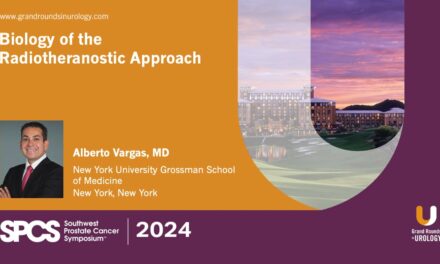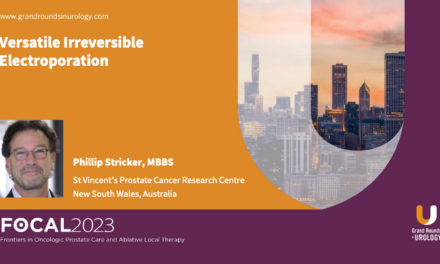Peter F. Orio III, DO, MS, presented “The Wild, Wild West of Radiation Oncology: An Update on Radiation Tools, Toys and Trials” during the 32nd Annual International Prostate Cancer Update (IPCU32) conference on March 8, 2022, in Snowbird, Utah.
How to cite: Orio III, Peter F. “The Wild, Wild West of Radiation Oncology: An Update on Radiation Tools, Toys and Trials.” March 8, 2022. Accessed Dec 2025. https://grandroundsinurology.com/an-update-on-radiation-oncology-brachytherapy-tools-toys-and-trials/
The Wild, Wild West of Radiation Oncology: An Update on Radiation Tools, Toys and Trials – Summary
Peter F. Orio III, DO, MS, Vice Chair of Network Operations for Dana-Farber/Brigham and Women’s Cancer Center Department of Radiation Oncology and Associate Professor of Radiation Oncology at Harvard Medical School in Boston, Massachusetts, explains how prostate brachytherapy is effective, efficient, and convenient, and he says it is “the right thing to do for patients.” He discusses competition between the radiation oncologist brachytherapist communities because they have more lucrative technologies to offer, asserting that brachytherapy can achieve similar results to LINAC at a fraction of the cost. Dr. Orio says treating high-risk cancers is difficult, but when practitioners use brachytherapy, they are treating “from the inside out” with larger doses of radiation to kill the cancer. He cites both the FLAME trial and the ASCENDE-RT Trial, which he says demonstrates the benefits of dose and dose escalation. Dr. Orio addresses toxicity and strictures, as well as the importance of paying attention to anatomy, offering technical advice on how to locate the apex. He addresses arguments against brachytherapy regarding survival benefit, asserting that the first chance to cure is the best chance of cure. Dr. Orio further states that medical oncology is starting to take over androgen deprivation therapy; urologists have the tools to cure prostate cancer rather than waiting for patients to require salvage therapies. He expresses concern for scenarios whereby patients can be cured with definitive urological treatments but won’t receive them. Dr. Orio then switches gears to rectal spacing, calling it “something that will define my generation as a radiation oncologist,” because it allows for dose escalation, and addresses recent safety concerns about the procedure. Concluding, Dr. Orio challenges urologists to encourage their radiation oncologist colleagues to perform brachytherapy.
About the 32nd Annual International Prostate Cancer Update (IPCU32):
Presented by Program Chair E. David Crawford, MD, The International Prostate Cancer Update (IPCU), is a multi-day, CME-accredited conference focused on new developments in prostate cancer treatment, diagnosis, and prevention. IPCU 32 featured lectures, interactive discussions, panel roundtables, debates, and case reports. This conference was led by expert physicians and is designed for urologists, medical oncologists, radiation oncologists, and other healthcare professionals involved in the diagnosis and treatment of prostate cancer.
ABOUT THE AUTHOR
Peter F. Orio III, DO, MS, is Vice Chair of Network Operations for the Dana Farber Brigham Cancer Centers in Boston, Massachusetts. He also serves as the Director of Prostate Brachytherapy for the Dana Farber Brigham Cancer Centers and is an Associate Professor at Harvard Medical School. Dr. Orio earned his Bachelor of Arts in Biology/Psychology from the College of the Holy Cross, his Master’s of Science in Public Health from the University of Massachusetts at Amherst and his Doctor of Osteopathic Medicine degree from the University of New England College of Osteopathic Medicine. He completed his residency in radiation oncology at the University of Washington Medical Center. Dr. Orio served in the US Army as Assistant Chief of Radiation Oncology at Brooke Army Medical Center, where he rose to the rank of Lieutenant Colonel. Dr. Orio is active in the American Brachytherapy Society (ABS) and the American Society for Radiation Oncology (ASTRO), focusing his efforts on the advancement of brachytherapy for prostate cancer and the socioeconomics of medicine.




